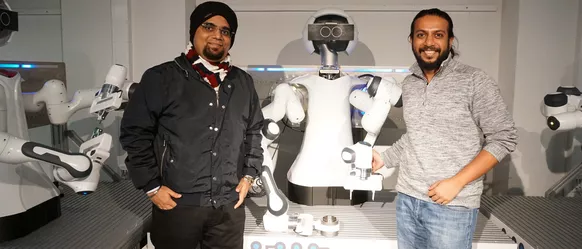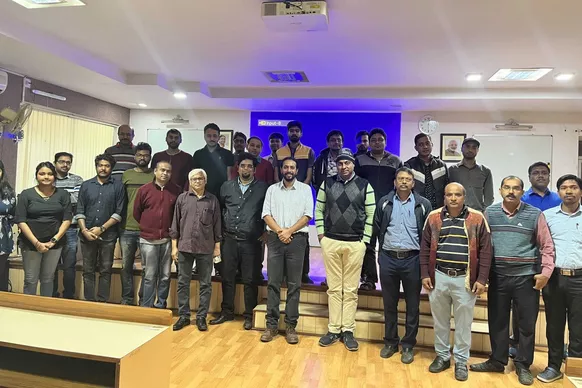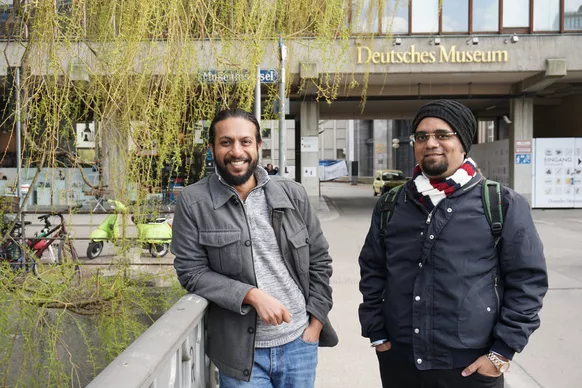Community
Indo-German Fellowship: a seed project for future collaboration in the field of prosthetics
Community |

Amartya and Saikat, the PECFAR Fellowship sounds like a fantastic opportunity to exchange knowledge and establish future collaborations in the field of prosthetics, what is the idea behind it?
Saikat: The fellowship aims to bring together researchers from academia and industry to collaborate on a seed project focused on prosthetic control for individuals with trans-radial amputations. The project seeks to develop innovative solutions using motion capture technology to record human hand movements and replicate them in a robotic hand. A simulated environment for testing and training facilitates this real-time interaction between the human operator and the robotic hand. The use of low-cost motion capture technology promotes accessibility and encourages innovation in the field of robotics and prosthetics.
Amartya: Another aspect of the project involves developing an open-source musculoskeletal model to study grasping mechanisms in humans. This model can be used to improve the functionality and design of prosthetic devices. By sharing the model with the research community, collaboration, and knowledge sharing are encouraged, potentially accelerating advancements in prosthetics. Applying the knowledge gained from the model to end-effector prostheses can enhance their dexterity, precision, and naturalness of movement, closely mimicking natural hand movements and improving usability.
What is currently missing in your approach?
Amartya: The current approach of using muscle signals for prosthesis control and developing a model for executing manipulation tasks is innovative but has several hardware limitations. These limitations include the accuracy and reliability of muscle signals, limited signal resolution for fine-grained control, adaptability to different users, the need for training and calibration, the complexity of manipulation tasks, and the challenges of hardware integration.
Saikat: To address these limitations, ongoing research and development efforts are necessary. Collaboration between researchers, engineers, and clinicians is crucial to improving the accuracy, adaptability, and functionality of muscle signal-based control systems. By addressing these hardware limitations, the goal is to make the control systems more reliable and effective for executing manipulation tasks with prosthetic devices.
What are the next steps?
Amartya: To achieve a comprehensive understanding of prosthetic control, the project will involve mechatronics and control experts, engage hospitals and NGOs for prototype testing, conduct clinical trials, and address country-specific considerations.
Saikat: The ultimate goal is to foster a larger collaboration that combines musculoskeletal modeling and technology transfer to enhance the capabilities of prosthetic devices.
Why did you decide to apply to this fellowship and how can someone do it?
Saikat: The PECFAR Fellowship is an early career award that invites researchers from Indian and German institutions to visit each other for a duration of two months in each country. To apply for the fellowship, interested individuals need to meet the minimum requirements of a master's degree and be within the age limit. They can find more information and application details on the fellowship's official website.
Amartya: In our case, both India and Germany have vibrant research communities and thriving industries in the field of prosthetics. Applying to this fellowship provides an opportunity to engage with researchers, industry professionals, and experts in the field of prosthetics in both India and Germany. It offers a platform to establish connections, foster collaboration, and contribute to advancements in research, technology, and industry practices related to prosthesis control.


Dr. Amartya Ganguly works in the field of biomechanics, neuro-musculoskeletal modeling and assistive technologies. With a PhD from The University of Hull and postdoctoral experience at Keele University, he has made significant contributions, including the development of a state-of-the-art real-time neuromusculoskeletal model of the human hand. Dr. Ganguly's achievements include being selected for the prestigious Horizon 2020 Innosup program, testing the world's first pediatric exoskeleton at Marsi Bionics, Spain, and leading the Intelligent Neuroprosthetic research group at TU Munich. He has extensive expertise in CE certification, wearable assistive devices, and clinical trials.
He is currently a Principal Scientist at CSIR Central Mechanical Engineering Research Institute, Ministry of Science and Technology, Govt. of India with dual appointment as Associate Professor in the Academy of Scientific and Innovative Research at the CSIR-CMERI campus. He holds a Masters and Ph.D. in Mechatronics from the same institute. His research interests include Mechatronics and Robotics, Data Science, Cyber Physical Systems, Non Linear Control System, IoT and Embedded Electronics.